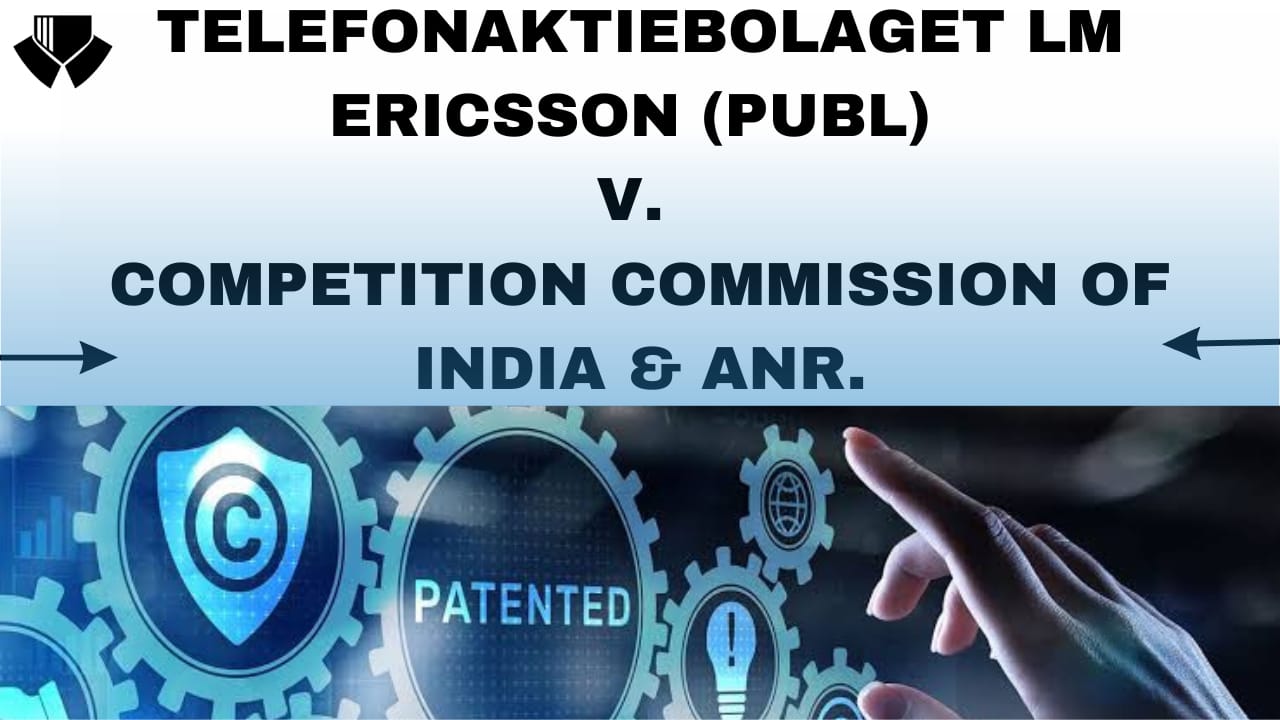By, Nandhini, Vivekananda College of Law, Karnataka State Law University.
CITATION: IN THE HIGH COURT OF DELHI AT NEW DELHI LPA 247/2016
BENCH: HON’BLE MR JUSTICE VIBHU BAKHRU.
DATE: 16th November 1992
PARTIES: Mr C.S. Vaidyanathan, Senior Advocate,
Ms Prathiba M. Singh, Senior Advocate with Mr Chander M. Lall, Mr Anand S. Patak, Mr Ravishekhar Nair, Ms Saya Choudhary Kapur, Mr Ashutosh Kumar, Ms Archana Sahadeva, Ms Shivanghi Sukumar, Ms Sakshi Agarwal, Mr Akashay Nanda, Ms Rukma George, Mr Arjun Khera, Mr B. Prashant Kumar, Mr Aditya Jayraj, Mr Sahib Singh Chaddha and Ms Harita
Sahadeva, Advocates. …Petitioners Versus
Mr A.N. Haksar, Senior Advocate with Mr
Pankaj Seth and Mr Shonik Mazumdar,
Advocates for R-1/CCI.
Mr Arun Kathpalia, Advocate with Mr Vaibhav Gaggar, Mr Nitish Sharma, Mr Aaditya Vijay Kumar, Mr Abhimanyu Chopra, Mr Samaksh Goyal, Ms Neha Mishra, Ms Samali Verma and Mr Shaksham Dhingra, Advocates for R-2.
Mr Aditya Narain, Amicus Curiae with Mr Arnav Narain Mr Shashank Bhushan, Ms Anushree Narain and Ms Anahita Varma,
Advocates. …Respondent
Introduction:
The legal case involves Telefonaktiebolaget LM Ericsson (Ericsson) and the Competition Commission of India (CCI) regarding allegations of anti-competitive behaviour and abuse of dominant position by patentees under the Competition Act. The judgments and petitions discussed the jurisdiction of the CCI to inquire into actions of patentees exercising their rights under the Patents Act. The case questions whether the Competition Act overrides the Patents Act in such matters. It also delves into the provisions of Chapter XVI of the Patents Act and Sections 21 and 21A of the Competition Act. The court rulings and arguments revolve around the legislative intent and the scope of authority of the CCI versus the Controller under the two statutes.
Facts:
Ericsson and Monsanto challenged decisions made by the Competition Commission of India (CCI), leading to the filing of various writ petitions. Ericsson filed LPA/246/2016 and LPA/247/2016 against CCI, Intex Technologies, and Micromax Informatics, contesting a judgment dated 30.03.2016 that dismissed two writ petitions filed by Ericsson against CCI and Micromax and Intex. The latter two companies had alleged unfair and discriminatory licensing conditions for standard essential patents (SEPs). In response, CCI filed LPA/550/2016, challenging a 2015 judgment in a writ petition by Ericsson against CCI and Best IT World.
Moreover, Monsanto lodged LPA/150/2020, disputing a 2020 judgment in WP(C) 1776/2016, where CCI was granted permission to proceed against Monsanto under the Competition Act based on information provided by informants.
Additionally, Ericsson initiated WP(C) 8379/2015 against CCI, alleging non-compliance with fair, reasonable, and non-discriminatory terms for SEPs, potentially violating Sections 3 and/or 4 of the Competition Act.
Issues:
The issues in this case primarily revolved around the jurisdictional dispute between the Competition Commission of India (CCI) and patentees, specifically Telefonaktiebolaget LM Ericsson and Monsanto, regarding the Competition Act and the Patents Act. They contested whether the CCI has the authority to inquire into the actions of patentees exercising their rights under the Patents Act. The key issues included:
- Whether the CCI can investigate the rate of royalties and conditions imposed for licensing under the Competition Act.
- Interpretation of Chapter XVI of the Patents Act as a complete code for dealing with anti-competitive practices.
- Legislative intent concerning the Competition Act’s jurisdiction over patent-related matters.
- The assertion by patentees that their rights under the Patents Act should not be overridden by the CCI under the Competition Act.
- Whether the CCI has the power to investigate matters related to the exercise of patent rights and potential anti-competitive behaviour by patentees.
- The conflict between the Competition Act and the Patents Act with respect to addressing anti-competitive practices and abuse of dominant position by patentees.
Contentions of petitioner and respondent:
Petitioner:
The exercise of rights by patentees under the Patents Act cannot be overridden by the Competition Commission of India (CCI) under the Competition Act.
- As patentees, they have exclusive rights to prevent third parties from using their process or product.
- Detailed provisions in Chapter XVI of the Patents Act safeguard against anti-competitive agreements and abuse of dominant position.
- The licensing of patents is not a sale or purchase of goods/services, and the CCI does not have jurisdiction over matters related to the exercise of patentee rights.
- The jurisdiction of the CCI is ousted on matters concerning anti-competitive practices by patentees.
Respondent:
The CCI has the power to inquire into allegations of anti-competitive behavior by patentees, particularly at nascent stages.
- The overlap between the Patents Act and the Competition Act does not detract from the power vested with the CCI under the Competition Act.
- The CCI’s authority extends to cases of anti-competitive practices by patentees, and its decisions apply across the market.
- The mechanism under the Patents Act is insufficient to address allegations of anti-competitive or abusive behaviour by patentees.
- Legislative history indicates that the CCI should have the power to inquire into anti-competitive practices by patentees.
Judgement:
The judgment set aside the 2016 and 2020 judgments while quashing the CCI proceedings, asserting that the Patents Act prevails over the Competition Act. It clarified that the judgment does not express an opinion on the claims of anti-competitive behavior by Ericsson and Monsanto. Emphasizing that the 2015 judgment was upheld, it invalidated the CCI proceedings due to lack of jurisdiction post-settlement between the parties. The Court found that the CCI was not empowered to investigate patentee rights under the Competition Act and erred in assessing the relevant provisions. Ultimately, the legislative intent favored the Patents Act overriding the Competition Act in addressing anti-competitive practices by patentees, concluding that the CCI had no jurisdiction over such matters..
Conclusion:
the Competition Commission of India (CCI) does not have jurisdiction over actions of enterprises exercising their rights as patentees under the Patents Act. The Court upheld the patentees’ contention that the Patents Act prevails over the Competition Act in addressing anti-competitive practices and abuse of dominant position by patentees. Therefore, the judgments of 2016 and 2020 were set aside, and the CCI proceedings were quashed. The Court emphasized that the legislative intent favoured the Patents Act overriding the
Competition Act in matters concerning patentees’ rights and anti-competitive behaviour. As a result, CCI’s jurisdiction in such cases was held to be lacking.
References:
- Indian Kanoon. https://indiankanoon.org/doc/164770226/
- Live Law. Delhi High Court Judgement. https://www.livelaw.in/pdf_upload/judgementphp-2-481114.pdf


